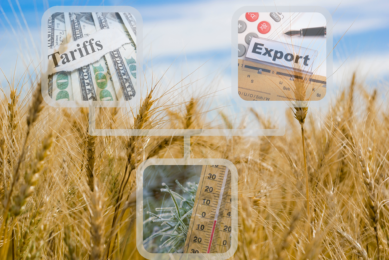Kazakhstan traders demand full ban on Russian agricultural imports

Kazakhstan’s grain market is reeling owing to overwhelming imports of Russian grain, some of which are delivered through grey channels. Traders call on authorities to temporarily ban all agricultural imports to save the industry from collapse, though it would contradict the Russia-Kazakh trade agreements within the Eurasia Economic Union.
Amid shrinking opportunities on the global market, Russian grain is putting extraordinary pressure on the Kazakhstan market, Amir Butirkhanov, a Kazakh agricultural trader, told a local news outlet APK Novosti.

“We traders forecasted this [scenario] a long time ago,” Butirkhanov said, adding that things are expected to worsen in 2025. “They [Russian grain exporters] have fewer dollar contracts. They are left with only rouble contracts [for selling Russian grain to foreign customers] and barter trade with African and Arab countries.”
Illicit imports
In this background, Russian firms are ramping up efforts to sell as much grain as possible to Kazakhstan.
According to the Kazakh Agricultural Ministry, Kazakhstan imported 1 million tonnes of grain from Russia since the beginning of the year. However, traders believe this figure is close to 3 million tonnes, as the lion’s share of deliveries is not ending up in the official statistics, Butirkhanov claimed.
“Yesterday, I went towards the border [with Russia] in Petropavlovsk. Kamaz trucks loaded with Russian grain are going through in large numbers. They register wheat [at the border control] as peas, barley, and rye. The same situation is in Uralsk and Aktobe,” Butirkhanov said, adding that corruption of the Kazakh customs officials is the core of the problem.
Russian businesses are believed to register wheat as other agricultural commodities to avoid paying higher customs duties.
“All grain growers know the fee and how much they need to pay to pass. This is not a secret. It is necessary to introduce a complete ban on the import of absolutely all crops and flour from Russia,” Butirkhanov asserted, adding that otherwise the Kazakh market wouldn’t avert a collapse.
Prices to plunge
In this background, wholesale grain prices are expected to drop by nearly 20% to KZT 50,000 to 60,000 (€94 – 113) per tonne.
“It [the price] can even drop to KZT 20,000 to 30,000 (€38 – 57) per tonne. It certainly won’t rise. Kazakhstan’s agriculture is facing a catastrophe. Our authorities are not coping with the crisis,” he admitted.
In addition, Butirkhanov expressed doubts that Kazakhstan will actually harvest over 30 million tonnes of grain, as the Agricultural Ministry forecasted. It is possible that some share of that volume could be of Russian origin delivered to the country through the grey schemes.











